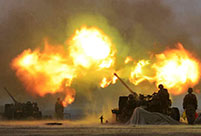 Top 100 beauties in the world!
Top 100 beauties in the world!
 Gallery: Who is the most beautiful one?
Gallery: Who is the most beautiful one?
 If you like autumn, put your hands in the air!
If you like autumn, put your hands in the air!
 Fan Bingbing's "Queen style" in new play
Fan Bingbing's "Queen style" in new play
 Lingerie show at 2014 Miss China
Lingerie show at 2014 Miss China
 J-10 fighters show aerobatic stunts in smog-free sky
J-10 fighters show aerobatic stunts in smog-free sky
 Charming contestants of Shanghai Int’l Model Contest
Charming contestants of Shanghai Int’l Model Contest
 Most amazing chi-pao beauties
Most amazing chi-pao beauties
 7 deadly animal attacks
Russia to launch 70 Proton rockets by 2020: official
7 deadly animal attacks
Russia to launch 70 Proton rockets by 2020: officialChina's top military body took over the People's Liberation Army auditing office on Thursday, Xinhua News Agency reported.
The auditing office of the army will be under the direct management of the Central Military Commission, the country's top military decision-making and command organ, a move that experts say will greatly enhance supervision of the army. The office was formerly managed by the PLA General Logistics Department.
The move, ordered by President Xi Jinping in his dual role as CMC chairman, was announced on Thursday at a meeting in Beijing.
Gu Junshan, former deputy head of the logistics department, was prosecuted on March 31 for embezzlement, bribery, misuse of State funds and abuse of power.
The CMC has adopted unprecedented, strict measures to fight corruption, including the investigation of some senior military officers, including Xu Caihou, former vice-chairman of the CMC. Xu was accused of taking advantage of his position to assist in the promotion of others and of using his influence to help others make monetary profits, taking a large number of bribes in return.
Previously a subsidiary of the logistics department, the auditing office now enjoys a more-independent status as an authority directly managed by the CMC, Xinhua said.
"This is a major decision made by Chairman Xi and the CMC in an effort to strengthen the army and tighten auditing and supervision over the military's economic activities. It's also a key measure to deepen national defense and military reform as well as to push forward the innovation of the army's auditing system," the statement said.
According to the statement, the restructuring, which is part of the army's wider-efficiency drive, will prevent and punish corruption as well ensure high-quality auditing work.
Xi orders change in oversight of army
CMC Vice-Chairman Fan Changlong said at the meeting: "The modernization of the army and its combat preparation processes are arduous missions. And we have entered another crucial stage."
Fan urged auditing officials to ensure professionalism, efficiency and policy knowledge to contribute to the army's fight against graft.
Thursday's decision followed a CMC-approved circular released late last month that called for a results-based management system to ensure the maximum benefit from spending.
According to the document, assessments will be introduced throughout the military, and individuals or units will be held accountable for inefficiency.
Modern warfare is expensive, which means cost control should be an important consideration for the military, it said.
"In the short term, the decision will become a direct effective measure to root out corruption in the army, and one that strengthens and enhances the anti-corruption work at present," said Liu Qinglong, a professor of administrative law at Tsinghua University.
In the long run, the move is a good attempt to stimulate innovation in army management, he said. When the auditing department was under the management of the logistics department, limited by the interest relationship and hierarchy, it was difficult for auditors to use their supervisory authority to the fullest, Liu said.
An improved anti-corruption mechanism is the key to eradicating corruption, he said.
Xie Chuntao, director of the Teaching and Research Department of Party History at the Party School of the Central Committee of CPC, agreed, saying the decision will greatly enhance oversight of the entire army.
The cases of Gu and Xu must be one of the major reasons that promoted change, he added. If audits are accurate and fair, problems will be discovered earlier and won't have the devastating effect that they do today, Xie said.
Xinhua contributed to this story.
 World Pole Dance Championship in China
World Pole Dance Championship in China In pics: PLA stages live-fire drill in NE China
In pics: PLA stages live-fire drill in NE China  59-year-old Liu Xiaoqing still looks stunning
59-year-old Liu Xiaoqing still looks stunning  Standard faces for each countries in the world
Standard faces for each countries in the world Shocking! Photos of Chinese fighters revealed
Shocking! Photos of Chinese fighters revealed Images of angels in white: At work v.s off work
Images of angels in white: At work v.s off work  Post-85s female pilots and their mission
Post-85s female pilots and their mission Netizens fall in love with champion swimmer Ning Zetao
Netizens fall in love with champion swimmer Ning Zetao Vibrant 21-year-old and her own Cheongsam brand
Vibrant 21-year-old and her own Cheongsam brand Top 10 most dangerous jobs in the world
Top 10 most dangerous jobs in the world  Top 10 fifth generation jet fighters in the world
Top 10 fifth generation jet fighters in the world Top 10 Chinese goddesses
Top 10 Chinese goddesses  Top 20 hottest women in the world in 2014
Top 20 hottest women in the world in 2014 Top 10 pure beauties in showbiz
Top 10 pure beauties in showbiz  Top 10 world's highest-paid models 2014
Top 10 world's highest-paid models 2014 The most gorgeous Chinese women
The most gorgeous Chinese women Top 10 most handsome faces in Asia
Top 10 most handsome faces in AsiaDay|Week|Month